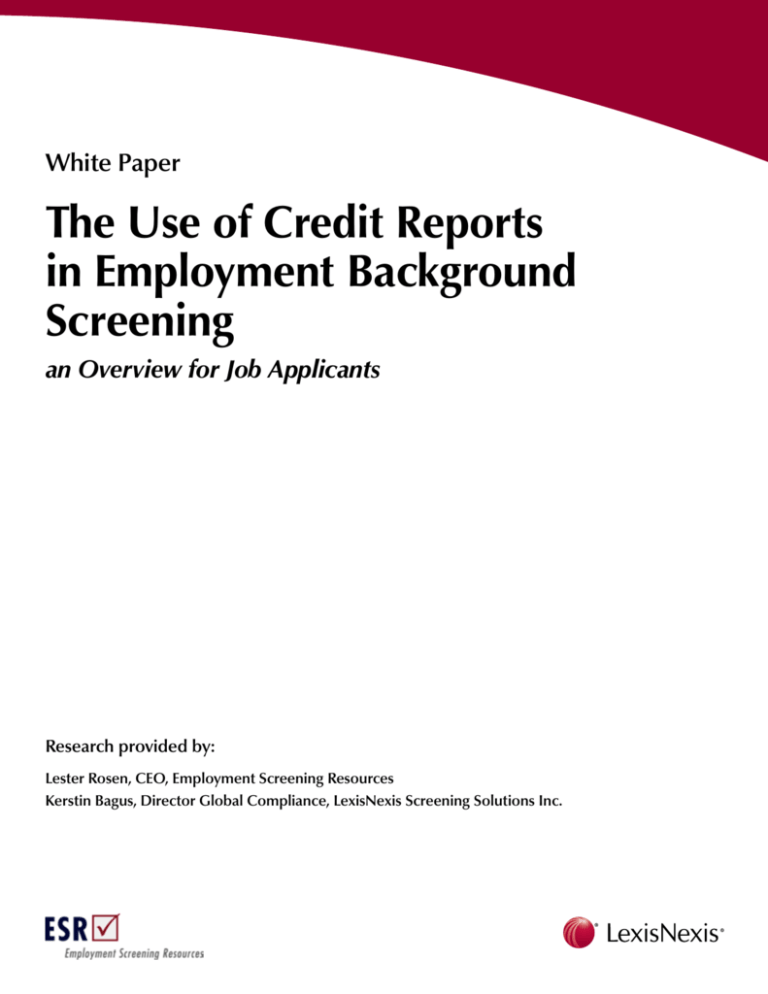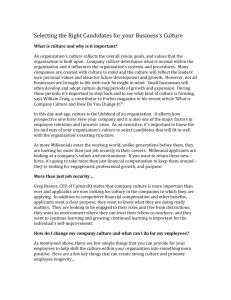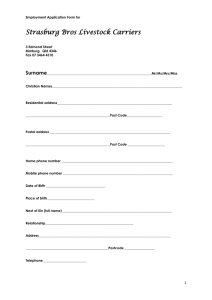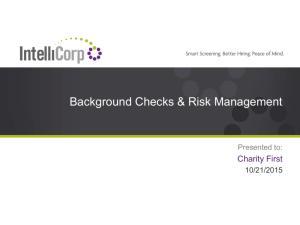
White Paper
The Use of Credit Reports
in Employment Background
Screening
an Overview for Job Applicants
Research provided by:
Lester Rosen, CEO, Employment Screening Resources
Kerstin Bagus, Director Global Compliance, LexisNexis Screening Solutions Inc.
The Use of Credit Reports in Employment Background
Screening—an Overview for Job Applicants
If you are looking for a job today there is a good chance a background
check will be conducted before or shortly after you are hired. Employers
and volunteer organizations, conduct background checks to verify the
information provided on an application and to conduct due diligence.
These background checks protect the employer and volunteer organization
in many ways, primarily by making sure the information they were
given on the job application is accurate and that the organization is not
hiring someone that is inappropriate for the position. This protects the
organization as well as their workers, customers, and sometimes the
general public.
Most often this background check will review criminal record history.
Other commonly checked areas are to identification information, the
education, professional license, and employment history provided by the
applicant. If driving is involved, driver’s license status and history are often
verified. Some employers will also check a person’s credit history during
the application process.
The subject of using credit reports in the job application process has been
in the news lately. Concern has been raised that when credit reports are
part of a background check, the information on the credit report may
be used unfairly against the job applicant. The following information is
intended to assist job applicants in understanding the role that a credit
report may play in a background check and to explain the differences
between a credit report used in the job application process versus a credit
report a lender may see.
The first thing to know is that there are different types of credit reports
depending on the purpose of the report. A credit report viewed by an
employer or volunteer agency is called an Employment Credit Report
and does not contain the same information as is found on a credit report
available to lenders or even the credit report you get when you exercise
your rights to view your own credit report from a credit bureau. The
employment version of a credit report does provide information about
your credit and payment history, just like other versions of a credit report.
However there are many things that are different in this version of a credit
report:
• A credit score is not available to employers. It is recognized by
credit bureaus, credit scoring companies, and background screening
companies that a credit score has no relationship to job performance
and is simply not provided to employers. Unlike the copy of the credit
report available to you, the employer cannot even pay extra to see a
credit score.
• Account numbers are not listed on the Employment Credit Report.
The source and type of credit is listed, such as the store name or loan
holder. But the specific account numbers are not on the employment
version of a credit report.
• Your age is not listed nor is your year of birth.
1
• The Inquiry is different and is not calculated in a credit score. An
Inquiry is the listing of who requested at your credit report. This must
be listed on every person’s credit history and is one of the things used
in determining a person’s credit score. There are different types of
Inquiries and they have different impact on a credit report and a credit
score. When an employer or volunteer agency orders an Employment
Credit Report, a special type of Inquiry is listed on the person’s credit
history that is not used in the credit scoring process. In some cases,
this Employment Inquiry may not be visible to other organizations
who request your credit report – it may only be visible to you and the
credit bureau. (This may not be the case for all Employment Credit
Reports and depends on how the specific credit bureau treats these
Employment Inquiries.)
Secondly, employers are not running credit reports in order to find ways
to deny jobs to applicants. Background checks cost employers money
and time. Employers run background checks, including credit reports,
AFTER they have gone through the time, cost and effort to find the right
candidates, usually from a large field of applicants. An employer does not
invest money in a background report just to find ways not to hire. When
an employer orders a background check, it is because they are interested
in hiring the applicant and are conducting due diligence to make sure
there is no business related reason not to hire that person.
Third, employers have obligations they must follow before not hiring
someone as a result of any part of a background check obtained from
a Consumer Reporting Agency (a company that provides these types
of background checks), including a credit report. Employers, and the
background screening firms that provide these reports, do not take these
obligations lightly. There are serious penalties if the employer fails to follow
through with their obligations. (See the FTC’s web site at www.ftc.gov for
more information.) More on how this affects you as a job applicant below.
What should a job applicant do regarding credit reports and
job hunting?
First, understand that if you get to the point where an employer is running
a background check, that is great news. It means you made it though the
preliminary stages of the hiring process so that you are most likely one of
the final candidates being considered for the job.
Secondly, if you are concerned that a background check may include a
credit report, do not be the last to know what your credit report may say.
As a consumer (that is the term used to identify a person whose report
is being viewed), you are entitled to a free credit report every 12 months
from each of the credit bureaus, and more often in some states and under
certain circumstances. Go to https://www.annualcreditreport.com/cra/
index.jsp for information on how to get your free credit report. If you see
some sort of error, it would be a good idea to get that corrected as soon
as possible. There is a well established procedure for contacting the credit
bureaus to bring an error to their attention and request it be corrected. The
The Use of Credit Reports in Employment Background Screening—an Overview for Job Applicants
2
FTC has excellent information about the use of credit reports and credit on
their website at http://www.ftc.gov/bcp/menus/consumer/credit.shtm.
Third, if you are concerned that your credit history may reflect negatively,
have a discussion ahead of time with the hiring manger or Human
Resources about your credit reports. As most experienced Human
Resources professionals can tell you, information honestly disclosed by an
applicant has much less impact than information the employer discovers
for themselves.
Also keep in mind that hiring professionals understand that people have
to deal with the realities of life. For example if a person was undergoing
economic stress due to the recession, and relied on credit cards, or there
was a medical issue that caused bills, let Human Resources or the hiring
manager know. Also keep in mind that the only reason you are having
this discussion is that the firm is seriously considering hiring you, and
has gone through allot of time and effort to make that decision, including
reviewing numerous other resumes.
Consumer Resources:
www.ftc.gov
http://www.ftc.gov/bcp/menus/
consumer/credit.shtm.
https://www.annualcreditreport.
com/cra/index.jsp
Fourth, applicants need to keep in mind that they have rights. Under
the federal Fair Credit Reporting Act (FCRA), a credit report is only
obtained after the applicant has given consent and after a legally required
disclosure on a standalone document has been given. Before the employer
utilizes the credit report in any way not to hire, an applicant is entitled
to a copy of their credit report in what is known as a pre-adverse action
notice. You are also required to receive a document called a Statement of
Rights, which will list your rights and also information on how to correct
information on the report.
The bottom-line: If an employer feels a credit report is job related, keep
in mind that the employer has made you a finalist, and therefore has an
interest in hiring you. You were evaluated without the employer having
any idea of what was in the credit report. Protect your credit history. Think
of it as one piece of your reputation. Know what is in your credit report
and correct errors. If there are negative entries, be prepared to share it
before the credit report is run.
The Use of Credit Reports in Employment Background Screening—an Overview for Job Applicants
3
Employment Screening Resources (ESR) and LexisNexis® Screening Solutions are consumer reporting agencies.
Due to the nature of the origin of public record information, the public records and commercially available data sources used in reports may contain errors. Source data is sometimes
reported or entered inaccurately, processed poorly or incorrectly, and is generally not free from defect. This product or service aggregates and reports data, as provided by the public
records and commercially available data sources, and is not the source of the data, nor is it a comprehensive compilation of the data. Before relying on any data, it should be independently verified.
LexisNexis and the Knowledge Burst logo are registered trademarks of Reed Elsevier Properties Inc., used under license. Other products and services may be trademarks or registered
trademarks of their respective companies. Copyright © 2010 LexisNexis Risk Solutions and Employment Screening Resources (ESR). All rights reserved. NXR0????-0 01/10









